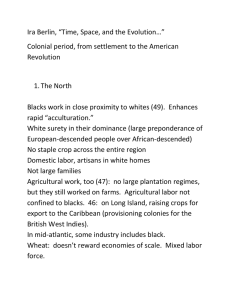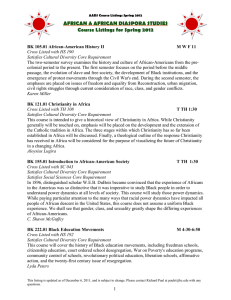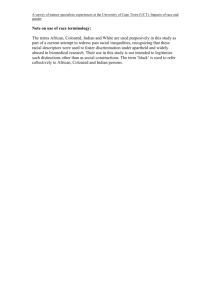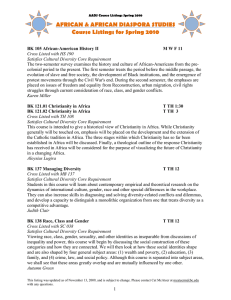A FRICAN & AFRICAN DIA SPOR A STUDIE S
advertisement
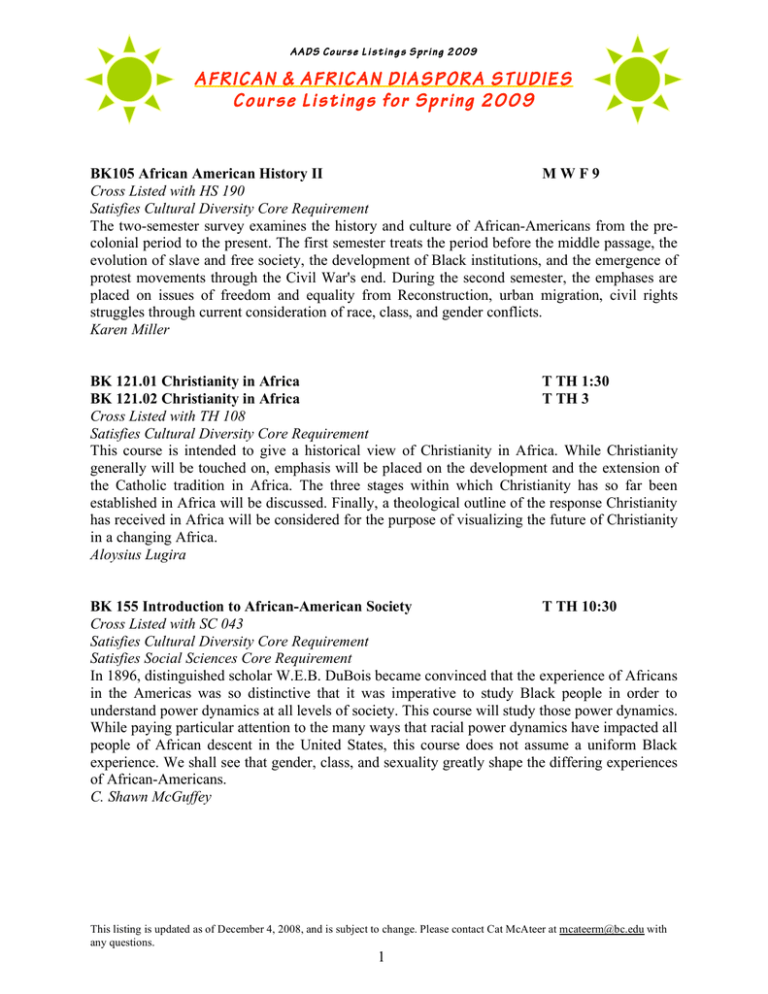
A A DS Co ur s e L i s t i n g s S pr i n g 2 009 A F R I C A N & A F R I C A N DI A S P OR A S T UDI E S C o u r se L i st ings fo r S p r ing 20 0 9 BK105 African American History II MWF9 Cross Listed with HS 190 Satisfies Cultural Diversity Core Requirement The two-semester survey examines the history and culture of African-Americans from the precolonial period to the present. The first semester treats the period before the middle passage, the evolution of slave and free society, the development of Black institutions, and the emergence of protest movements through the Civil War's end. During the second semester, the emphases are placed on issues of freedom and equality from Reconstruction, urban migration, civil rights struggles through current consideration of race, class, and gender conflicts. Karen Miller BK 121.01 Christianity in Africa T TH 1:30 BK 121.02 Christianity in Africa T TH 3 Cross Listed with TH 108 Satisfies Cultural Diversity Core Requirement This course is intended to give a historical view of Christianity in Africa. While Christianity generally will be touched on, emphasis will be placed on the development and the extension of the Catholic tradition in Africa. The three stages within which Christianity has so far been established in Africa will be discussed. Finally, a theological outline of the response Christianity has received in Africa will be considered for the purpose of visualizing the future of Christianity in a changing Africa. Aloysius Lugira BK 155 Introduction to African-American Society T TH 10:30 Cross Listed with SC 043 Satisfies Cultural Diversity Core Requirement Satisfies Social Sciences Core Requirement In 1896, distinguished scholar W.E.B. DuBois became convinced that the experience of Africans in the Americas was so distinctive that it was imperative to study Black people in order to understand power dynamics at all levels of society. This course will study those power dynamics. While paying particular attention to the many ways that racial power dynamics have impacted all people of African descent in the United States, this course does not assume a uniform Black experience. We shall see that gender, class, and sexuality greatly shape the differing experiences of African-Americans. C. Shawn McGuffey This listing is updated as of December 4, 2008, and is subject to change. Please contact Cat McAteer at mcateerm@bc.edu with any questions. 1 A A DS Co ur s e L i s t i n g s S pr i n g 2 009 BK 174 Modern Latin America MWF1 Prerequisite: Any two semesters of HS 001 through HS 094 Cross Listed with HS 174 Satisfies Cultural Diversity Core Requirement This course explores the political and social consequences of independence and the building of national states in former colonies still deeply dependent within the international economy; the long endurance and final abolition of slavery in Brazil and Cuba; the emergence of U.S. economic imperialism and military interventionism, with the revolutionary responses in Cuba in 1898 and in Mexico in 1910; the consolidation of the American empire after World War II; and the revolutionary challenges in Cuba and Central America. Zachary Morgan BK 222 Black Education Movements M 4:30-6:50 Cross Listed with HS 192 Satisfies Cultural Diversity Core Requirement This course will cover the history of Black education movements, including freedman schools, citizenship education, court ordered school desegregation, war on poverty's education programs, community control of schools, revolutionary political education, liberation schools, affirmative action, and the twenty-first century issue of resegregation. Lyda Peters BK 285 Jazz in America M 4:30 Cross Listed with MU 322 This course provides a thorough and detailed study and examination of the Black music that has come to be known as jazz. The socio-political nature of Black music in America, Black music in education, and the relationship between Black music and the mass media are considered. Hubert Walters BK 291 Voices of Imani W 4:30 This course emphasizes study and performance of the religious music of the Black experience known as Spirituals and Gospels. One major performance is given each semester. Concerts and performances at local Black churches also occur with the Voices of Imani Gospel Choir. The Gospel Workshop will provide the lab experience for MU 321 (BK 266) and MU 322 (BK 285). Members of these classes will be required to attend a number of rehearsals and performances of the Gospel Workshop. Members of the classes may sing in the choir but it is not required for the course. Hubert Walters BK 299.01 Readings and Research BK 299.04 Readings and Research The Department by arrangement by arrangement This listing is updated as of December 4, 2008, and is subject to change. Please contact Cat McAteer at mcateerm@bc.edu with any questions. 2 A A DS Co ur s e L i s t i n g s S pr i n g 2 009 BK 318 Post Slavery History of Caribbean Cross Listed with HS 318 Satisfies Cultural Diversity Core Requirement See course description in the History Department. Frank Taylor MW3 BK 329 The Caribbean During the Cold War M W F 12 Prerequisite: Prerequisite: Any two semesters of HS 001 through HS 094 Cross Listed with HS 329 The focus is the Caribbean, a vitally strategic area as attested to most recently by the U.S. invasions of the Dominican Republic in 1965, Grenada in 1983, or Panama in 1989. The efforts of these small states to overcome their vulnerabilities provide a most fascinating subject. Of added interest is the fact that outside of Africa, the Caribbean countries are virtually the only sovereign communities of people of African descent in the world. We will analyze the historical ambience within which the states of the Commonwealth Caribbean operate and evaluate their attempts at maximizing their independence. Frank Taylor BK 342.01 Black Intellectuals MWF1 Satisfies Cultural Diversity Core Requirement As African Americans shed the shackles of slavery and enforced second-class citizenship, they documented their perception of the new world in which they found themselves. They wrote on the conditions they endured, the effects of white prejudice, the brutality of the systematic exclusion from the American dream, and the soulless, amoral and dehumanizing institution of slavery. Blacks also expounded upon the complexities of self-identification, the differences in the African American world and the white world, as well as the new African created by the Atlantic slave trade, and the romantic mythology of Africa. Issues of social, cultural and political development were discussed, as were social justice, protest, and self-actualization. Black intellectuals held a mirror up to the world and consciously sought to expose, identify and explore what they perceived. Their contributions are the underpinnings of our cultural norms, and much of what they describe has become imbedded in our sub-conscious shaping our understanding of our world. Students will be asked to read and participate in class discussions around the broad themes introduced in the writings of such intellectuals as W.E.B. DuBois, Frantz Fanon, Malcolm X, Martin Luther King, Jr., Joy Jamison, Ida B. Wells and Barbara Jordan. This course seeks to ensure that students are familiar with the most prominent of these discussions and are able to exercise critical and analytical evaluation of them in order to lay a strong foundation for continued understanding, participation and contribution to the world of Africans in Diaspora. Sandra Sandiford Young This listing is updated as of December 4, 2008, and is subject to change. Please contact Cat McAteer at mcateerm@bc.edu with any questions. 3 A A DS Co ur s e L i s t i n g s S pr i n g 2 009 BK 368 Bermuda & Caribbean Business W 4:30-6:50 Cross Listed with MJ 600 This course in international law and business practice uses an island 600 miles from the American shoreline as a study example of the interrelationship of all sectors of Bermuda with the United States. Bermuda is a nation currently 70% non-white in racial composition. The international business, international banking, and tourism sectors will be studied as well Caribbean integration. Frank J. Parker, S.J. BK 385 Health and Disease in the African American Experience M W F 10 Cross Listed with HS 528 This course examines the historical relationships between race, medicine, and health care from the era of New World slavery to the age of AIDS. In doing so, we will pay particular attention to the role of ideas of racial difference in the production of medical knowledge, the historical persistence of racial disparities in the delivery of health care, and folk and professional healing within the African American community. Martin Summers BK 405 American Masculinities M W F 12 Cross Listed with HS 544 This course surveys the history of masculinity in the United States from the colonial era to the late twentieth century. It explores how men and women have constructed ideas of manhood; how those ideas have been shaped by other categories of identity - such as race, ethnicity, class, sexuality, and region; and how men have performed their identities as gendered beings. This course will examine the ways in which masculinity has been historically constituted in the United States and how men and women of varying backgrounds have affirmed, contested, and/or disrupted these historically-constituted meanings of manhood. Martin Summers BK 430.01 Race and Urban Space T TH 12 Prerequisite: Any two semesters of HS 001 through HS 094 Cross Listed with HS 530 Scholars and now even the larger public have conceded that race is a social construct. Yet this observation usually remains abstract and rarely rooted in the physical environments of everyday experience. Conversely, geographers and related urban studies scholars have also argued that space is not an inherent entity but is also a social construct. However, many are just beginning to fully explore how the specific dimensions and use of space is mediated by the politics of racial difference and/or racial identification. Therefore this course seeks to explore 1.) how racism and race relations shape urban spatial relations, city politics, and the actual built environment and 2.) how the historical development of cities (urban space) has shaped the form and content of racial identity as a lived experience. Covering the full 20th century, the course examines three critical junctures, Ghettoization (1890s-1940s), Metropolitan Formation (1940s-1990s) and Neo-Liberal Gentrification (present). Each historical juncture is organized around a set of keywords (i.e. restrictive covenants, redlining, environmental racism) to help ground our understanding of how race and space have variably intersected over time in constructing the urban experience. Davarian Baldwin This listing is updated as of December 4, 2008, and is subject to change. Please contact Cat McAteer at mcateerm@bc.edu with any questions. 4 A A DS Co ur s e L i s t i n g s S pr i n g 2 009 BK 442 Intercultural and International Communications MW3 Cross Listed with CO 442 Satisfies Cultural Diversity Core Requirement This course studies communication as it relates to culture, and as it occurs interculturally and internationally. In those contexts, questions and issues will be pursued which reveal processes, effects, methods, and critical norms for evaluating interpersonal, group, and mass communication. Roberto Avant-Mier BK 460 New Orleans: Justice in the City T TH 10:30 Cross Listed with TH 458 This course investigates, analyzes, and grapples with the history, problems, and prospects of New Orleans in the wake of Hurricane Katrina. One of the objectives of the course is to spend Spring Break in New Orleans engaged in some form of service towards its recovery. M. Shawn Copeland BK 462 Popular Music and Identity M W 4:30 Cross Listed with CO 462 The goal of this course is to increase the understanding of basic concepts and principles of popular music as a form of communication, and specifically, popular music as a symbolic form of behavior that relates to individual and group identity. This course will introduce you to theory and research in the area of popular music studies in communication, and will help you apply this knowledge in understanding popular music as meaning-making cultural practice. Seeing music as culture, we use both transmission and ritual/symbolic perspectives to address social/cultural dimensions of popular music in the U.S. as well as in international contexts. Roberto Avant-Mier BK 470.01 Popular Fictions in the Americas T TH 1:30 Popular Fictions in the African Diaspora asks: what do contemporary discussions of race look like when depicted in popular literature written by African Diaspora writers? Students address this question by examining contemporary gothic literatures-- specifically horror, science fiction, and mystery as well as urban romances-- to determine how each form represents concerns of 20th/21st century black peoples in the US, Canada, and the Caribbean. Our focus on these literatures’ explorations of race is complemented by historical and sociological studies of these countries. Writers central to this examination are: Steven Barnes (US, fantasy), Octavia Butler (US, science fiction), Patrick Chamoiseau (Martinique, mystery), Colin Channer (Jamaican, urban romance), Samuel Delaney (US, science fiction), Eric Jerome Dickey (US, urban romance), Tananarive Due (US, horror), E. Lynn Harris (US, urban romance), Nalo Hopkinson (Canadian, fantasy), Terry McMillan (US, urban romance), Walter Mosley (US, mystery/detective), and Barbara Neely (US, mystery). The critical grounding for this course derives from Toni Morrison’s observation of an eerily gothic vein in 19th/early 20th century North American literature, one that reflected writers’ fear of the unknown quality of the North American landscape and the still-forming American identity, as well as the influence of enslaved Africans on both. To put it simply, Morrison noted that writing that featured irrationality, horrific atmospheres, and mysteriously violent occurrences best represented early American writers’ This listing is updated as of December 4, 2008, and is subject to change. Please contact Cat McAteer at mcateerm@bc.edu with any questions. 5 A A DS Co ur s e L i s t i n g s S pr i n g 2 009 fears and highlighted how they used blackness (people and personifications) to allay them. Grounded in this way, Popular Fictions supposes and students will be asked to investigate how popular literature written by African Diaspora writers re-frames the qualified representations of blackness that Morrison observed. Rhonda Frederick BK 512 History of Black Nationalism M W F 12 Prerequisite: Any two semesters of HS 001 through HS 094 Cross Listed with HS 280 Students must have taken one African-American History course. This course examines the evolution and diversity of Black Nationalism and nationalist ideologies in the United States from the early nineteenth century through the present. Detailed study of several distinct nationalist strategies, including emigrationist, separatist, cultural, and accommodationist, and their proponents will allow students to analyze and compare the forces influencing the evolution, proliferation, retrenchment, and resurgence of nationalist constructs at various points in African-American history. Karen Miller BK 514 American Civil War and Reconstruction T TH 9 Prerequisite: Any two semesters of HS 001 through HS 094 Cross Listed with HS 514 This course will study the Civil War and the Age of Reconstruction, paying special attention to the transformation of American politics in the second half of the nineteenth century. We will examine the conflict between North and South from a number of perspectives: military, social, and cultural. In addition, the course will consider the struggles of Reconstruction and the legacies of emancipation. Christian Samito BK 600 Senior Seminar T 5-7:20 Prerequisite: BK 110 Introduction to the African Diaspora Corequisite: Department Permission Required As the capstone course for the African and African Diaspora Studies minor, this course draws upon the work of sociologists, philosophers, feminists and critical theorists to critically examine the concept of race and the phenomenon of racism in the United States. Topics will include the social construction of race and gender, white privilege, race and identity. M. Shawn Copeland BK 799 Readings and Research Prerequisite: Departmental permission Cynthia Young by arrangement This listing is updated as of December 4, 2008, and is subject to change. Please contact Cat McAteer at mcateerm@bc.edu with any questions. 6
